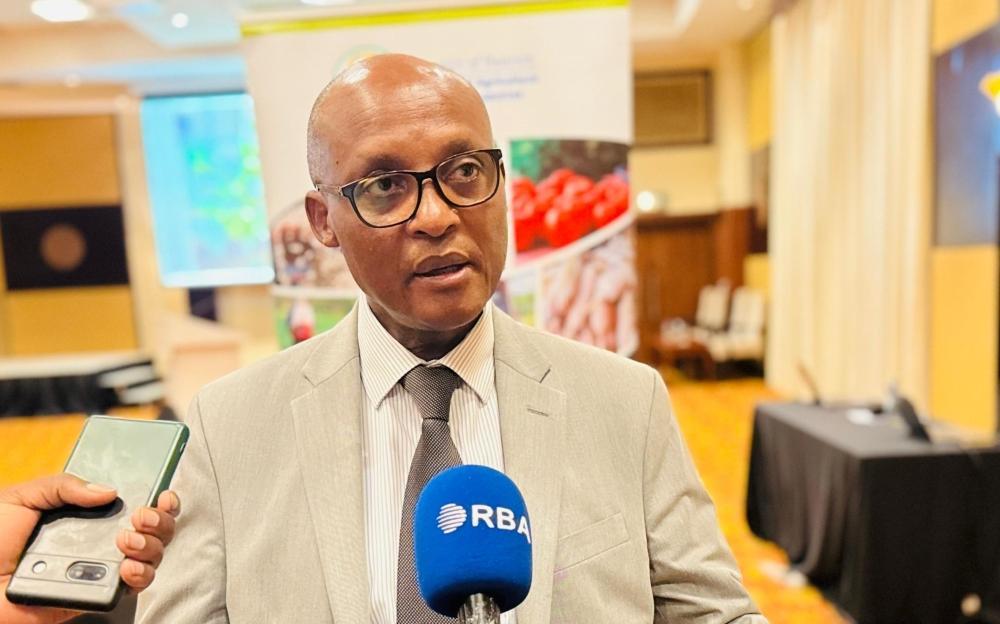Africa-Press – Rwanda. As the government targets to raise agriculture’s share of total bank loans from 6 per cent to 10 per cent by 2029, the Minister of Agriculture and Animal Resources, Mark Cyubahiro Bagabe, has called on lenders to accept commodity supply contracts as loan collateral.
He argued this will significantly improve farmers’ and agri-exporters’ access to finance.
Bagabe made the remarks on August 14 in Kigali, during a high-level meeting focused on strengthening Rwanda’s agricultural export sector through increased production, market access, and improved financing mechanisms, among other means.
While agriculture accounts for about 25 per cent of Rwanda’s GDP, it receives a disproportionately low share of bank loans.
“Our farmers, businesses and institutions must be supported today to reap the rewards of the future,” Bagabe said.
A real-life example
Bagabe shared an experience from a visit to a coffee cooperative in Gatsibo District, Eastern Province, whose name he did not mention.
The cooperative, which had secured a $300,000 coffee export contract to the UK, was unable to get financing from local banks using that contract as collateral. Instead, it received funding from an American bank, Bagabe stated.
For him, domestic financial institutions should finance local farmers and exporters to help them meet the demands of foreign buyers. This way, local banks can also benefit from the resulting transactions, rather than allowing the funds tied to those contracts to flow to foreign financial institutions.
“Foreign banks use contracts they [a farmer or exporter] have with the buyers as collateral and give a loan to them so that they utilise it and pay back,” he said, adding that this solves the issue of limited guarantee in the form of property such as houses or land.
Bankers’ concerns
Bagabe acknowledged that local banks often cite loan default and fund diversion as a risk. However, he stressed that such cases are minimal and should not prevent banks from supporting the sector.
He highlighted government efforts to reduce financing risks through blended financing schemes, which provide matching grants — such as a facility under the Commercialization and De-Risking for Agricultural Transformation (CDAT) project. Through this initiative, farmers can access loans at an interest rate of around 9 per cent, compared to the usual market rate of 17 percent, he indicated.
Bagabe noted that the government subsidises 40 per cent of agricultural insurance premiums for farmers to further de-risk financing to agriculture.
“So, all these solutions are going to make it easier for the agri-exporters to access finance,” he said.
Banks cite lack of collateral, willingness to pay as major concerns
Bank representatives at the event cited a lack of collateral and willingness to repay loans as major issues constraining lending to agriculture, especially for smallholder farmers.
Paul Sagnia, Chief Operating Officer at I&M Bank, acknowledged that collateral remains a challenge but emphasised that the bigger issue is the willingness to repay.
“Banks lend based on two things: ability to pay and willingness to pay,” Sagnia said.
He indicated that sometimes, a bank may grant a loan to a person who has said that they are going to invest in a viable agriculture project, but divert funds to open a hotel, leading to their inability to pay back.
“The bottom line is if we can unlock how we enforce willingness to pay, there will be no stopping of funding. Once the banks are sure they can get returns, you will not have to encourage any bank to participate in any venture. And agriculture is not an exception,” he said.
A farmer’s perspective
Sonia Murungi, a farmer and exporter, said that banks’ concerns over fund diversion are understandable, but the issue should not be generalised because not all farmers or exporters divert funds or do not repay the loans.
She suggested banks could pay directly for services or products listed in the loan application, as is done in countries like Kenya.
“If I want to buy seeds, I bring an invoice. If I need to pay RwandAir [for freight], I have an air bill. That way, 80 per cent of the loan is guaranteed to go to its intended purpose,” she said.
She added that many farmers lack traditional collateral but have valid commodity supply contracts.
These contracts can serve as reliable security, she said, indicating that if banks know a farmer or exporter’s buyer and the account receiving the payments, that’s something tangible they can trust.
The agriculture minister supported the proposal, suggesting that banks could adopt a model where they pay directly for the products or services required by farmers and exporters, rather than disbursing cash. He held that this approach could help address concerns around loan diversion and repayment.
For More News And Analysis About Rwanda Follow Africa-Press






